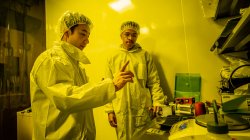Professor Earns NSF CAREER Grant to Advance Nuclear Physics Research
Grant will also provide access to high-level research for students typically underrepresented in laboratory science
Posted in: Grants and Awards, Physics

Montclair State University Assistant Physics Professor Kent Leung and the students in his nuclear physics lab are asking big questions about the universe. Questions like: “How did matter emerge following the Big Bang?” “Are there any undiscovered particles and forces out there?” and “How do we describe the forces that hold neutrons together?” With these questions and others, they’re looking to further understand the vital role neutrons play in the universe.
With the help of a five-year $616,289 CAREER Grant from the National Science Foundation, Leung aims to create a new experimental nuclear physics research program that will work toward finding answers to those questions.
“Neutrons participate in all four fundamental forces of nature – and perhaps in undiscovered forces too – making them an ideal system for expanding our knowledge in fields spanning nuclear physics, particle physics, astrophysics and cosmology,” Leung says. “Despite being the most abundant subatomic particle on Earth, neutrons have remained elusive experimentally because of their lack of electric charge and limited lifetime outside the atom before decaying. However, these same properties make them an ideal testbed and probe for new science.”
The NSF CAREER grant builds on a five-year $436,000 grant Leung was awarded last September from the U.S. Department of Energy’s Oak Ridge National Laboratory, which supports equipment for research into the neutron’s extremely small electric dipole moment, which has never been observed. The electric dipole moment is a measure of how electric charge is distributed within a neutron. Determining its value could shed light on fundamental problems in physics, including how more matter than antimatter was leftover after the Big Bang or the existence of new particles that might explain dark matter.
